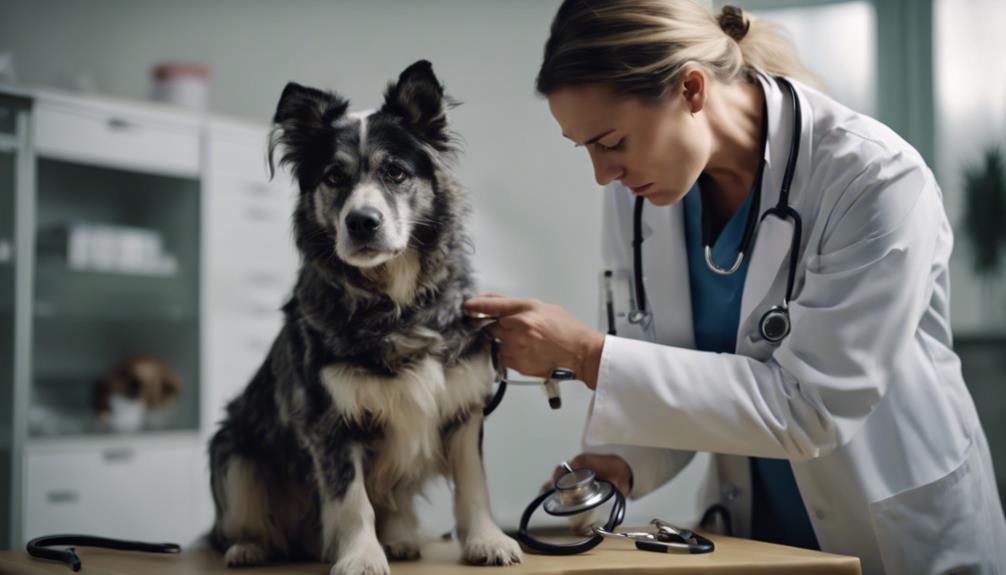Exploring the complexities of dog vomiting unveils a myriad of causative factors that necessitate a discerning approach from veterinary professionals.
While the sight of a pet in distress can prompt concern, decoding the underlying triggers of this symptom is imperative for effective management.
From dietary sensitivities to underlying health conditions, the spectrum of potential reasons behind a dog's vomiting episode demands a thorough investigation and targeted interventions.
By unraveling the intricate tapestry of canine health, veterinarians stand as pillars of expertise, guiding pet owners through the labyrinth of possible treatments to restore their beloved companions' well-being.
Key Takeaways
- Prompt diagnosis and treatment are essential for managing dog vomiting effectively.
- Understanding the difference between vomiting and regurgitation aids in accurate treatment.
- Treatment may involve withholding food, providing water, and transitioning to a bland diet.
- Preventive measures include monitoring diet, limiting access to harmful substances, and seeking veterinary care promptly.
Common Causes of Dog Vomiting
There are several common causes of dog vomiting that pet owners should be aware of to help identify and address the underlying reasons for their dog's symptoms.
One common cause is dietary indiscretion, where dogs ingest items like garbage, spoiled food, or foreign objects, leading to irritation or blockages in the digestive tract. Infections caused by bacteria, viruses, or parasites such as parvovirus or worms can also result in vomiting.
Other potential causes include food allergies, pancreatitis, liver or kidney disease, and certain medications. Additionally, motion sickness, heatstroke, or stress can trigger vomiting in dogs. Understanding these common causes can aid pet owners in recognizing when veterinary intervention is necessary to ensure their dog's health and well-being.
Importance of Timely Diagnosis
Prompt diagnosis of the underlying cause of dog vomiting is crucial for effective treatment and management of the condition. Timely identification of the specific trigger behind the vomiting episodes allows veterinarians to tailor treatment plans accordingly, addressing the root cause rather than just the symptoms.
Delayed diagnosis can lead to prolonged discomfort for the dog, potential complications, and unnecessary stress for both the pet and the owner. Additionally, certain causes of vomiting, such as ingestion of toxic substances or foreign objects, may require immediate intervention to prevent further harm.
Therefore, pet owners should promptly seek veterinary attention upon noticing persistent or concerning vomiting in their dogs to ensure timely diagnosis and appropriate care.
Understanding Vomiting Vs. Regurgitation

Understanding the distinction between vomiting and regurgitation in dogs is essential for pet owners to accurately recognize and address gastrointestinal issues in their canine companions.
Vomiting involves the forceful ejection of stomach contents, typically appearing as yellow fluid mixed with food, and may be accompanied by drooling or gagging. It results from contractions of the stomach and chest muscles.
On the other hand, regurgitation is a passive process where undigested food or liquid is brought up without effort, often in a tubular form without bile or stomach contents.
Recognizing whether a dog is vomiting or regurgitating can provide valuable information to veterinarians for diagnosing and treating underlying conditions effectively.
Treating Vomiting Due to Dietary Indiscretions
Recognizing and promptly addressing dietary indiscretions as a common cause of dog vomiting is crucial for pet owners in maintaining their canine companions' gastrointestinal health. Dietary indiscretions refer to the consumption of inappropriate or unfamiliar items, such as spoiled food, garbage, or table scraps, that can irritate the stomach lining and lead to vomiting in dogs.
When treating vomiting due to dietary indiscretions, it is essential to first withhold food for 12-24 hours to allow the stomach to settle. During this time, access to water should be provided to prevent dehydration. After the fasting period, a bland diet consisting of boiled chicken and rice can be gradually reintroduced to help soothe the digestive system and facilitate recovery.
If vomiting persists or other concerning symptoms develop, consulting a veterinarian is recommended for further evaluation and treatment.
Addressing Vomiting Related to Medical Conditions

The management of vomiting in dogs associated with medical conditions requires a thorough understanding of the underlying health issues contributing to this symptom. Medical conditions such as kidney disease, liver disease, gastrointestinal obstructions, pancreatitis, or inflammatory bowel disease can lead to persistent and severe vomiting in dogs. Identifying the specific medical condition causing the vomiting is crucial for effective treatment.
Symptoms like blood in vomit, weight loss, lethargy, and changes in appetite can provide valuable clues for diagnosis. Treatment for vomiting related to medical conditions may involve medications, dietary changes, surgery to remove obstructions, or other interventions specific to the underlying issue.
Prompt veterinary evaluation and tailored treatment plans are essential in addressing vomiting associated with medical conditions in dogs.
Diagnostic Tests for Dog Vomiting
Veterinary professionals utilize a range of diagnostic tests to pinpoint the underlying causes of dog vomiting, aiding in accurate treatment planning. These tests may include:
- Blood tests to assess organ function and check for infections.
- X-rays or ultrasounds to visualize the stomach and intestinal tract for any abnormalities.
- Fecal exams to identify parasites or gastrointestinal issues.
These diagnostic tools help veterinarians determine if the vomiting is due to dietary indiscretion, infections, organ dysfunction, foreign bodies, or other underlying medical conditions. By conducting these tests, vets can tailor treatment plans to address the specific cause of the vomiting, improving the overall health and well-being of the dog.
Home Care Measures for Vomiting Dogs

Implementing supportive care measures can aid in managing vomiting episodes in dogs at home. To help your dog during these episodes, consider withholding food for 12-24 hours to allow the stomach to settle.
Ensure access to fresh water to prevent dehydration. Once the fasting period is over, gradually introduce a bland diet like boiled chicken and rice in small, frequent meals. Monitor your dog closely for any signs of improvement or worsening.
Keep the environment calm to reduce stress, as anxiety can exacerbate vomiting. If vomiting persists or if your dog shows other concerning symptoms, seek veterinary advice promptly.
Home care measures can provide comfort and support to your furry companion during episodes of vomiting.
Preventing Vomiting Episodes in Dogs
How can owners proactively reduce the occurrence of vomiting episodes in their dogs? Here are some essential tips to help prevent vomiting in your furry companion:
- Monitor Diet: Ensure your dog eats a balanced diet suitable for their age and health condition.
- Slow Down Feeding: Encourage slower eating by using puzzle feeders or feeding smaller, more frequent meals.
- Limit Access to Harmful Substances: Keep hazardous items like toxic plants, chemicals, and small objects out of your dog's reach.
Recognizing Signs of Severe Vomiting

To ensure the well-being of your canine companion, it is crucial to recognize signs indicating severe vomiting episodes that may require immediate attention. Severe vomiting in dogs can manifest as persistent vomiting multiple times in a short period, vomiting daily for several days, or vomiting accompanied by other signs of illness such as diarrhea.
Additionally, the presence of blood in the vomit is a concerning indicator of a potentially serious underlying issue. Other alarming symptoms may include lethargy, weakness, dehydration, abdominal pain, or a distended abdomen. If you observe any of these signs in your dog, it is essential to seek prompt veterinary care to determine the cause of the severe vomiting and initiate appropriate treatment to ensure your pet's health and well-being.
Role of Nutrition in Vomiting Management
Nutritional adjustments play a significant role in managing vomiting episodes in dogs. When addressing vomiting in dogs, here are three key nutritional considerations to keep in mind:
- Dietary Modifications: Switching to a bland diet can help soothe the stomach and reduce irritation, such as boiled chicken and rice.
- Hydration: Ensuring adequate water intake is crucial, especially if vomiting has led to dehydration.
- Avoiding Trigger Foods: Identifying and eliminating potential trigger foods that may be causing gastrointestinal upset can help prevent future episodes.
Collaborating With Veterinarians for Vomiting Treatment

Collaborating effectively with veterinarians is essential for the successful treatment of vomiting in dogs, ensuring comprehensive care and accurate diagnosis. Pet owners should promptly seek veterinary attention when their dog is vomiting persistently or showing concerning symptoms.
Upon consultation, veterinarians will conduct a thorough physical examination, evaluate the dog's medical history, and may recommend additional diagnostic tests such as blood work, x-rays, or ultrasounds to pinpoint the underlying cause of the vomiting. Based on the findings, treatment options will be discussed, which may include dietary modifications, medication, or in severe cases, surgical intervention.
Conclusion
In conclusion, understanding the causes of dog vomiting and the importance of timely diagnosis is crucial for effective treatment. Distinguishing between vomiting and regurgitation, addressing dietary indiscretions, and recognizing signs of severe vomiting are essential steps in managing this common issue in dogs.
Collaborating with veterinarians, providing necessary information, and following recommended treatment protocols are vital for ensuring the well-being of our canine companions.




